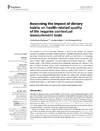Identificador persistente para citar o vincular este elemento:
https://accedacris.ulpgc.es/jspui/handle/10553/44623
| Campo DC | Valor | idioma |
|---|---|---|
| dc.contributor.author | Ruano-Rodríguez, Cristina | en_US |
| dc.contributor.author | Serra-Majem, Lluis | en_US |
| dc.contributor.author | Dubois, Dominique | en_US |
| dc.date.accessioned | 2018-11-22T01:08:58Z | - |
| dc.date.available | 2018-11-22T01:08:58Z | - |
| dc.date.issued | 2015 | en_US |
| dc.identifier.issn | 1663-9812 | en_US |
| dc.identifier.other | Scopus | - |
| dc.identifier.other | WoS | - |
| dc.identifier.uri | https://accedacris.ulpgc.es/handle/10553/44623 | - |
| dc.description.abstract | The increase of non-communicable diseases at all ages has fostered the general concern for sustaining population health worldwide. Unhealthy lifestyles and dietary habits impacting physical and psycho-social health are well known risk factors for developing life threatening diseases. Identifying the determinants of quality of life is an important task from a Public Health perspective. Consumer-Reported Outcome measures of health-related quality of life (HRQoL) are becoming increasingly necessary and relevant in the field of nutrition. However, quality of life questionnaires are seldom used in the nutrition field. We conducted a scientific literature search to find out the questionnaires used to determine the association between dietary habits and quality of life. A total of 13 studies were eligible for inclusion. Across these studies the short form-36, a generic (non-disease specific) HRQoL measurement instrument was the most widely used. However, generic measures may have limited content validity in the context of dietary habits interventions. We recommend additional contextual diet-specific HRQoL measures are also needed for evaluating the impact of diet habits on daily life functioning and well-being. | en_US |
| dc.language | eng | en_US |
| dc.relation.ispartof | Frontiers in Pharmacology | en_US |
| dc.source | Frontiers in Pharmacology [ISSN 1663-9812], v. 6, article 101 | en_US |
| dc.subject | 32 Ciencias médicas | en_US |
| dc.subject.other | Dietary Habits | en_US |
| dc.subject.other | General Population | en_US |
| dc.subject.other | Health Outcome Measures | en_US |
| dc.subject.other | Quality Of Life | en_US |
| dc.subject.other | Review | en_US |
| dc.subject.other | Mediterranean Diet | en_US |
| dc.title | Assessing the impact of dietary habits on health-related quality of life requires contextual measurement tools | en_US |
| dc.type | info:eu-repo/semantics/article | en_US |
| dc.type | Article | en_US |
| dc.identifier.doi | 10.3389/fphar.2015.00101 | en_US |
| dc.identifier.scopus | 2-s2.0-84930667828 | - |
| dc.identifier.scopus | 84930667828 | - |
| dc.identifier.isi | 000365038000002 | - |
| dc.contributor.authorscopusid | 56509637600 | - |
| dc.contributor.authorscopusid | 35596972100 | - |
| dc.contributor.authorscopusid | 7202196970 | - |
| dc.identifier.eissn | 1663-9812 | - |
| dc.identifier.issue | 101 | - |
| dc.relation.volume | 6 | en_US |
| dc.investigacion | Ciencias de la Salud | en_US |
| dc.type2 | Artículo | en_US |
| dc.contributor.daisngid | 5406856 | - |
| dc.contributor.daisngid | 28836 | - |
| dc.contributor.daisngid | 845395 | - |
| dc.description.numberofpages | 5 | en_US |
| dc.utils.revision | Sí | en_US |
| dc.contributor.wosstandard | WOS:Ruano-Rodriguez, C | - |
| dc.contributor.wosstandard | WOS:Serra-Majem, L | - |
| dc.contributor.wosstandard | WOS:Dubois, D | - |
| dc.date.coverdate | Enero 2015 | en_US |
| dc.identifier.ulpgc | Sí | es |
| dc.description.sjr | 1,855 | |
| dc.description.jcr | 4,418 | |
| dc.description.sjrq | Q1 | |
| dc.description.jcrq | Q1 | |
| dc.description.scie | SCIE | |
| item.grantfulltext | open | - |
| item.fulltext | Con texto completo | - |
| crisitem.author.dept | GIR IUIBS: Nutrición | - |
| crisitem.author.dept | IU de Investigaciones Biomédicas y Sanitarias | - |
| crisitem.author.dept | Departamento de Didácticas Específicas | - |
| crisitem.author.dept | GIR IUIBS: Nutrición | - |
| crisitem.author.dept | IU de Investigaciones Biomédicas y Sanitarias | - |
| crisitem.author.dept | Departamento de Ciencias Clínicas | - |
| crisitem.author.orcid | 0000-0002-0804-5524 | - |
| crisitem.author.orcid | 0000-0002-9658-9061 | - |
| crisitem.author.parentorg | IU de Investigaciones Biomédicas y Sanitarias | - |
| crisitem.author.parentorg | IU de Investigaciones Biomédicas y Sanitarias | - |
| crisitem.author.fullName | Ruano Rodriguez, Cristina | - |
| crisitem.author.fullName | Serra Majem, Luis | - |
| Colección: | Artículos | |
Citas SCOPUSTM
20
actualizado el 08-jun-2025
Citas de WEB OF SCIENCETM
Citations
21
actualizado el 15-feb-2026
Visitas
240
actualizado el 15-ene-2026
Descargas
151
actualizado el 15-ene-2026
Google ScholarTM
Verifica
Altmetric
Comparte
Exporta metadatos
Los elementos en ULPGC accedaCRIS están protegidos por derechos de autor con todos los derechos reservados, a menos que se indique lo contrario.
